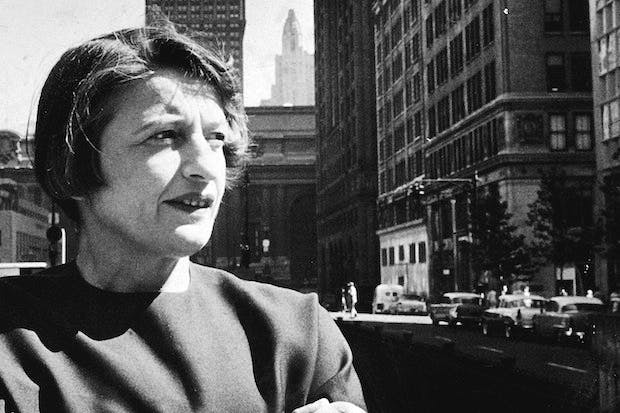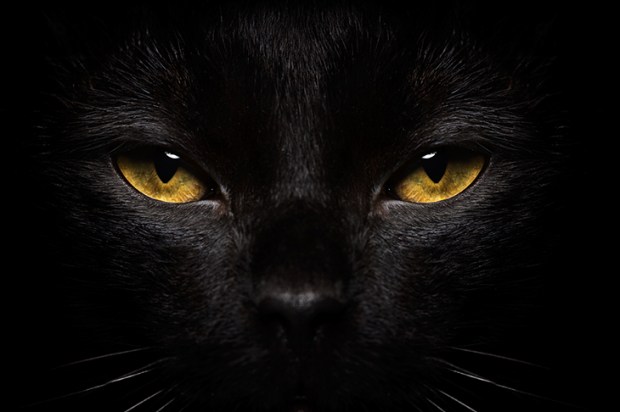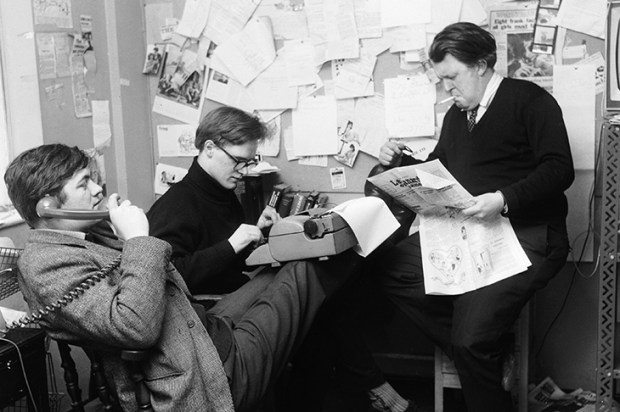I’m now half way through Atlas Shrugged and I’m loving almost every moment. But Ayn Rand isn’t someone you read for pleasure, I’m beginning to realise. She’s someone you read so you can underline sentences and scrawl in the margins ‘Yes’, ‘God that is so TRUE!’ and ‘YES!!!’
For example, at the heart of the novel are three romances between heroine Dagny Taggart and a trio of driven, dauntless free marketeers. But you don’t pay them any serious attention — not even during the sex scenes, which you skip quickly past in order to get to the much more exciting bits about industrial relations. Partly, it’s because Rand isn’t much of a prose stylist, least of all when she tries to do lyrical. And partly it’s because the novelistic flourishes are irrelevant almost to the point of being a nuisance. Whenever Rand attempts to fill in a bit more character detail, you feel rather as you would in The Pilgrim’s Progress if Bunyan started trying to sketch in a backstory for Mr Valiant-for-Truth. ‘No, no. We get it. He’s one of the good guys, that’s all we need to know. Now please, cut to the chase. How about, say, a nice, juicy rail disaster to give the lefties their comeuppance?’
In Rand’s parlance lefties are ‘looters’. This is why she inspires in readers of a libertarian or classical liberal persuasion such cultish adoration. There’s no nuance in Rand’s world, no weaselish, self-deluding pretence that if only we find the Third Way we can build a society which is both ‘fair’ and economically efficient. As far as Rand is concerned, if you’re not actively contributing to the economy you’re a parasite. Lots of us may secretly agree with this viewpoint, but few of us would dare admit it in public, which is why Atlas Shrugged has the thrill of the forbidden. ‘Wow!’ you think. ‘So it isn’t just me, then?’
Needless to say, lefties loathe Rand. They claim her philosophy is heartless and selfish — a charge she answers rather well, I think, in passages like the one where she describes the chain of events caused by the delay of a train carrying oranges and lettuces from California to New York. The spoiling of the stock causes several dependent businesses — fruit growers, a commission house, a plumbing company to which the commission house owed money, a lead-pipe company which supplied the plumber — to fold. But nobody except the companies involved notices. ‘When people were starving, said the newspapers, one did not have to feel concern over the failures of business enterprises which were only private ventures for private profit.’
This is one of those classic Randian tick-in-the-margin moments. What she’s addressing here is a fundamental misconception at the root of all leftist thinking: that statism is essentially benign and cost-free. The reason that train was so delayed was because of various well-meaning government interventions to protect workers, promote social equity, soften capitalism’s brutal tendency towards creative destruction. But the sclerosis brought about by these measures makes everyone worse off — rich and poor alike, but most especially the poor. So who are the real bastards, Rand tacitly asks: the kindly progressives or the ruthless wealth creators?
Rand is so sure in her moral indignation that she feels no need to prettify her argument with sops to leftist sentiment (having spent her teenage years in Lenin’s Russia she knew whereof she spoke). In British terms this makes her much more of a Thatcherite than a Cameroon. Were Rand around today she would no doubt be driven apopleptic by the attempts of conservatives to rebrand themselves as ‘compassionate.’ That’s because she’d recognise these exercises for what they are: needless concessions to a wicked and implacable enemy who, in a decent world, would be treated without mercy.
If that makes me sound a bit of a Randian myself, then I’m proud of it. For me, Atlas Shrugged is the right-winger’s answer to The Ragged-Trousered Philanthropists — the landmark book which, if properly understood and absorbed, makes it virtually impossible to be anything other than a classical liberal.
And what was relevant when the book was published in 1957 seems even more so now as the proportion of the economy occupied by the state has grown and grown, giving rise to precisely the inequality, the corruption, the waste, the injustice, the inefficiency and human suffering that Rand predicted. ‘Who is John Galt?’ Well, unfortunately, there isn’t one — that bit was fantasy. But there’s a superabundance of government-endorsed parasites like Wesley Mouch.
One of them is Jeremy Wates, an Irish environmental activist who, not unlike the slippery Mouch, has risen without trace through the EU hierarchy to become head of something called the European Environmental Bureau. As James Forsyth has reported, this democratically unaccountable lobbyist — working on behalf of hard-left, deep-green pressure groups like Greenpeace and Friends of the Earth — was given space at a meeting of the European Environmental Council to lecture 28 national environment ministers, including our own Owen Paterson, on the evils of shale gas. Such is this dangerous nobody’s influence that he may even succeed in effecting an EU-wide ban.
Can you imagine the absurdity of this situation? Well Ayn Rand did. In Atlas Shrugged, she invented a miracle technology called Rearden Metal — widely opposed by sundry left-wing vested interests on various spurious grounds. So it is in our own world with the current disinformation campaign against shale gas. Though it has been dressed up as a debate about safety, what it really is — as Rand would have understood — is just another attack launched by the progressives in their endless war on progress.
Sometimes you need an extravagant satire like Atlas Shrugged to show your own world as it is in all its outrageous awfulness. I’d commend it especially to anyone with a job title which includes the words ‘sustainability’, ‘diversity’ or ‘equality’. Looters all.
Got something to add? Join the discussion and comment below.
Get 10 issues for just $10
Subscribe to The Spectator Australia today for the next 10 magazine issues, plus full online access, for just $10.















Comments
Don't miss out
Join the conversation with other Spectator Australia readers. Subscribe to leave a comment.
SUBSCRIBEAlready a subscriber? Log in